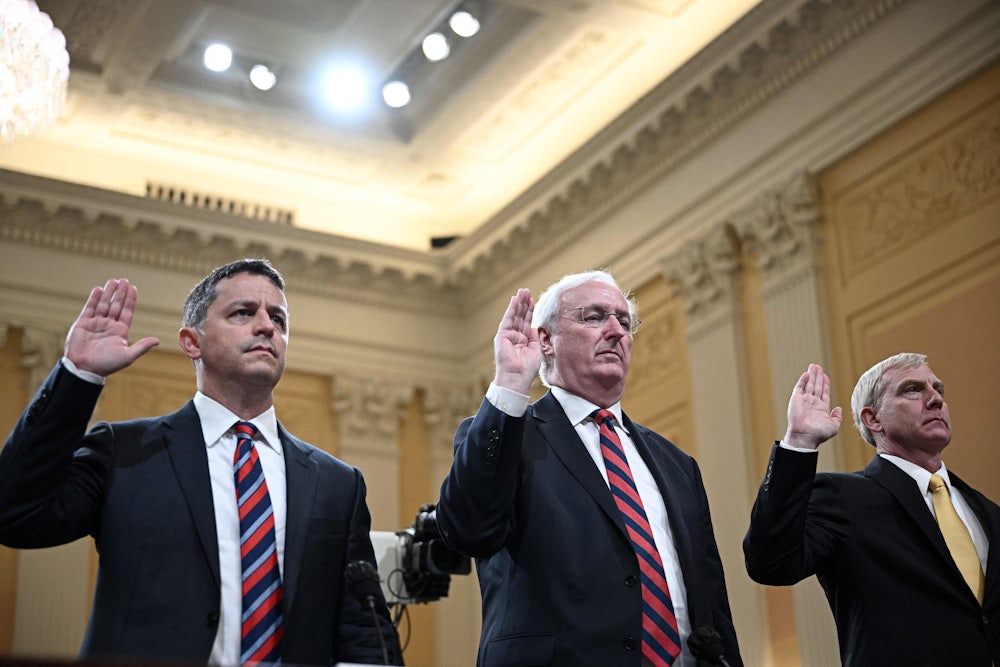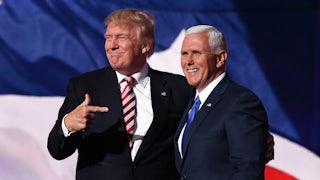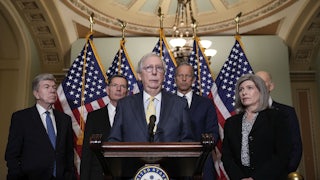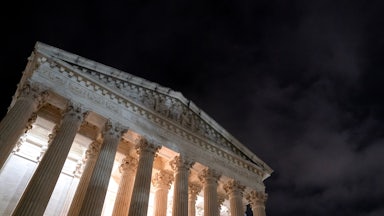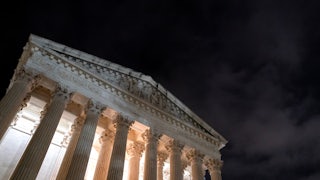It is an iron law of political scandal: Inevitably, there are echoes of Watergate. But at Thursday’s fifth hearing of the January 6 committee, the Watergate echoes reverberated so loudly that they were like shouted words bouncing off the walls of a canyon.
Begin with the event that would have gone down in history as the Sunday Night Massacre.
The most powerful story of the hearing was former acting Deputy Attorney General Richard Donoghue’s account of an Oval Office meeting late in the day on Sunday, January 3, 2021. Donoghue, who joined the meeting late dressed in jeans and muddy boots, was a compelling storyteller with a knack for the perfect anecdote.
President Donald Trump’s assumption was that the meeting would ratify his choice of Jeffrey Clark—an environmental lawyer whom Donoghue considered “not competent”—as the new acting attorney general. Clark’s only virtue in Trump’s eyes was that this legal backbencher would act on every wild-eyed, crazed conspiracy theory about a stolen election.
Trump was told by Donoghue, acting Attorney General Jeffrey Rosen, and Steve Engel, the head of the Office of Legal Counsel, that they would all resign in protest if Clark were named. But then Donoghue made the larger point when he told Trump, “You’re going to lose your entire department.… Your entire departmental leadership will walk in hours. And I don’t know what happens after that.” Donoghue ended by appealing to Trump’s vanity: “Mr. President, within 24 to 72 hours, you will get hundred[s] and hundreds [of] resignations of the leadership of the entire Justice Department because of your actions. What’s that going to say about you?”
For the moment, Trump backed down. Sort of. But 90 minutes later, he was on the phone with Donoghue peddling a new bogus storyline about the supposed discovery of a truck “filled with shredded ballots in Georgia.” It was a telling example of how Trump was impervious to truth, even when his entire Justice Department (the sniveling Clark aside) told him that there was no factual basis of any meaningful election irregularities anywhere.
President Richard Nixon was only mentioned once, in passing, during Thursday’s hearing, but his ghost hovered over the proceedings. The threatened mass resignations were nearly a replay of the October 1973 Saturday Night Massacre. Nixon wanted to fire special prosecutor Archibald Cox, in part, because he was too aggressively pressing for the release of the White House tapes. But Attorney General Elliot Richardson and his deputy, William Ruckelshaus, both resigned in protest after refusing to oust Cox. The dirty deed was finally done by Solicitor General Robert Bork, later to become a leading right-wing jurist and failed Supreme Court nominee.
In his opening statement Thursday, Republican Congressman Adam Kinzinger outlined a guiding principle of the Justice Department: “The president cannot and must not use the department to serve his own personal interest. And he must not use its people to do his political bidding, especially when what he wants them to do is to subvert democracy.”
That same principle was at the heart of Watergate. The “smoking gun” White House tape that forced Nixon’s resignation featured a conversation between the president and top aide H.R. Haldeman plotting how to get the CIA to pressure the FBI to back off in its investigation of the Watergate break-in. As Garrett Graff summarizes the tape in his book, Watergate: A New History, “The White House had intended to stonewall the FBI investigation from the start, and Nixon was in on it.”
The January 6 hearings, which will go on hiatus until mid-July, are in themselves a twenty-first-century replay of the 1973 Senate Watergate inquiry under the chairmanship of Sam Ervin. In large measure, Republican Congresswoman Liz Cheney—whose fearless prosecutorial zeal has trumped her very conservative voting record in the eyes of many liberals—can be seen as the equivalent of Ervin, whose country-lawyer charms masked a long record of leading Senate filibusters against civil rights legislation.
Like the Watergate hearings, Thursday’s session offered fleeting moments of levity and colorful language. Eric Herschmann, a former Trump White House attorney, recounted telling Clark on hearing of his planned anointment by Trump, “Good, fucking asshole. Congratulations, you just admitted that your first step or act you would take as attorney general would be committing a felony.” And Donoghue recalled dismissing Clark’s claims to expertise in criminal law by sneering, “You’re an environmental lawyer, how about you go back to your office and we’ll call you when there’s an oil spill.”
Rehearing the insults from early 2021 was the least of Clark’s problems on Thursday. Early in the morning of the hearing—with no warning to the House committee—Justice Department investigators searched Clark’s house and seized his electronic devices. Standing in front of his home in pajamas, Clark may have sensed that this would not be a day that would shimmer in memory.
The hearing ended with another nod to Watergate and the subsequent Nixon pardon by President Gerald Ford. Video depositions by Herschmann and Cassidy Hutchinson, a former White House aide, revealed that five fire-breathing Republican House members (Andy Biggs, Matt Gaetz, Louie Gohmert, Marjorie Taylor Greene, and Scott Perry) had sought blanket pardons for their efforts to overturn the 2020 election. In addition, Hutchinson recalled that Jim Jordan (the bellowing and blustering right-winger whom House GOP leader Kevin McCarthy had tried to put on the committee) had also hinted about mass pardons for Republican members of Congress.
In a closing statement, Kinzinger said, “We on this committee may be able to shine light on that darkness. But that is not enough. It is now up to every American, now and in the future, to stand for truth, to reject the lies whenever we confront them.”
Watergate ended with an overwhelming majority—including most congressional Republicans—rejecting Nixon’s lies and his perversion of justice. As they said then, the system worked. Pray God, may history repeat itself.
